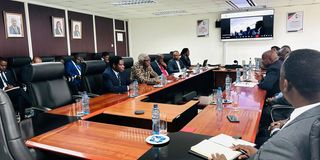Tanzania, Zambia to strengthen energy sector through enhanced cooperation

What you need to know:
- The partnership will focus on key areas such as sharing technical, economic, and infrastructure information, capacity building for experts, and exchanging professional experiences.
Lusaka. Tanzania’s Energy and Water Utilities Regulatory Authority (Ewura) and Zambia’s Energy Regulation Board (ERB) have agreed to enhance cooperation in economic and technical areas to improve energy services in both countries.
During a meeting held on Monday, March 24, 2025, at the ERB offices in Lusaka, the two institutions announced plans to sign a memorandum of understanding (MoU) to formalize their collaboration.
The partnership will focus on key areas such as sharing technical, economic, and infrastructure information, capacity building for experts, and exchanging professional experiences.

Speaking at the meeting, Ewura Board Chairperson, Prof Mark Mwandosya, highlighted the progress already achieved through the collaboration, particularly in regulating the petroleum, natural gas, and electricity sub-sectors.
“One of our major achievements is the joint inspection of the TAZAMA oil pipeline. This has not only enhanced the safety and efficiency of this critical infrastructure but also demonstrates our commitment to strengthening regulatory standards in the region,” said Prof Mwandosya.
ERB Board Chairperson, Mr James Banda, emphasized that the forthcoming MoU will be a key milestone in improving energy services and enhancing operational efficiency.
“This collaboration marks a crucial step in advancing the sectors we regulate. The formal agreement will enable us to build on our achievements and drive further improvements,” he said.
Once signed, the MoU is expected to boost regulatory cooperation, enhance energy sector efficiency, and promote sustainable energy management for both countries.





